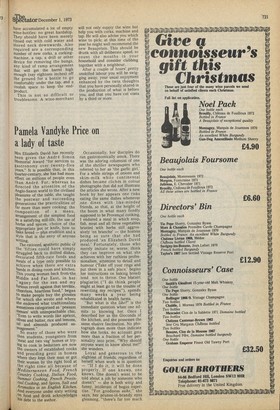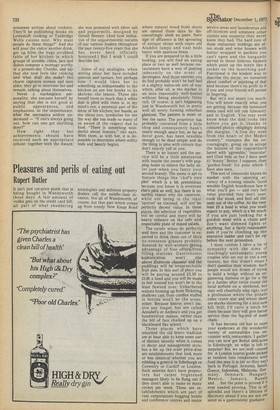Pamela Vandyke Price on a lady of taste
Mrs Elizabeth David has recently been given the Andre Simon Memorial Award "for services to gastronomy over twenty-five Years." It is possible that, in this quarter-century, she has had more effect on millions of people even than Andre. For, whereas he directed the attention of the Anglo-Saxon world to the civilised Pleasures of the table, she taught the postwar and succeeding generations the practicalities of tar more than mere cooking: the composition of a menu, arrangement of the simplest food as a satisfying still-life, the use of herbs and spices, choice of the appropriate pot or knife, how to bake bread — plus erudition and a Style that is the envy of anyone Writing. The rationed, apathetic public cif the 'fifties could have simply struggled back to doilied dishes, 'decorated fifth-rate foods and Meals of a type only possible to achieve when there are extra hands in dining-room and kitchen. This young woman back from•the Middle and Far East, in her agony for the sun and my furious revolt against that terrible, Cheerless, heartless food," began to make people buy the glossies for which she wrote and where She endowed what traditionalists sometimes categorised as 'peasant messes' with unimpeachable chic. "Even to write words like apricot, olives and butter, rice and lemons, oil and almonds produced assuagement."
So many of those who were. then students, youngsters from • 'Meat and two veg' homes or trying to cook in bedsitters are now the owners of established cooks and presiding genii in homes 'Where they kept their man or got their woman by the right food at the right time all because of Mediternanean Food, French Country Cooking, Italian Food, Summer Cooking, French Provincial Cooking, and Spices, Salt and Aromatics in an English Kitchen. And everyone under sixty writing :°11 food and drink acknowledges his debt to the author.
Occasionally, her disciples do run gastronomically amok. There was the adoring columnist of one of the shriller newspapers who referred to her as 'the garlic girl.' For a while strings of onions and skim-milk white continental dishes became clichés in colour photographs that did not illustrate the articles she wrote. After a new book by her appears one risks eating the same dishes whenever one dines with like-minded friends, so that, at the height of the boom in what many fondly supposed to be Provencal cooking, I endured a meal in which soup, fish, meat and all three vegetables bristled with herbs still aggressively 'en branche' — the hostess being so sure that she had produced 'an Elizabeth David meal.' Fortunately, those who merely imitate or, worse, think they can improve on what she achieves with her ruthless professionalism, attention to detail and humour ('Take off your rings and put them in a safe place,' begins her instructions on baking bread) tend not to thrive. One blatant plagiarist ("I do think people might at least go to the trouble of rewriting my recipes"), spends many weeks a year being rehabilitated in health farms.
"But what is she like?" is the immediate question when one admits to knowing her. Once I described her as the Gioconda of the kitchen, and she possesses the same elusive fascination. No photograph does more than indicate how she looks, no account gets more than a fraction of her personality into print. "Why should ,anyone want to know about me?" she wonders.
.Loyal and generous to the slightest of friends, regardless of herself when work is in question — "If I do it, it will be done properly. If one knows, one knows. One doesn't want to be told about a job by someone who doesn't" — she is both witty and funny, intolerant of bogus expertise. "For goodness sake," she says, her prunes-in-brandy eyes gleaming, "there's far too much
nonsense written about cookery. They'll be publishing books on Lowestoft cooking or Tunbridge Wells cuisine next. Why must people do these things?" And she will pour the visitor another drink. get up from the huge scrubbed table of her kitchen in which groups of utensils, china, jars and dishes compose a montage worthy of a present-day Chardin, and say that she now feels like cooking and what shall she make? Her charm captures women and men alike; they go to interview her and remain, talking about themselves.
Never a marketplace personality, she excuses herself by saying that she is not good at public appearances, and emphasises, to the importunate, what the uncreative seldom understand — "If one's always going out, how can one get anything done?"
How right that her achievements should have received such an appropriate tribute: together with the Award, she was presented with silver salt and peppermills, designed by Gerald Benney. (And how indicative of the ungastronomic natures of our various leaders throughout the past twenty-five years that she has never been officially honoured.) But I wish I could. describe her.
Some of my analogies, when writing about her, have included quinces and caviare, but perhaps now I would liken her to something as indispensable to the kitchen as are her books to its shelves: the lemon. These she herself loves so much that a white dish is piled with them is, in my mind's eye, a perennial part of the (Wmof her kitchen; her hands, as she slices one, symbolise for me the way she has made so many of us aware of the respect due to food. "There is something wonderful about lemons," she says. With them, as with her, it is impossible to determine where utility ends and beauty begins.











































 Previous page
Previous page